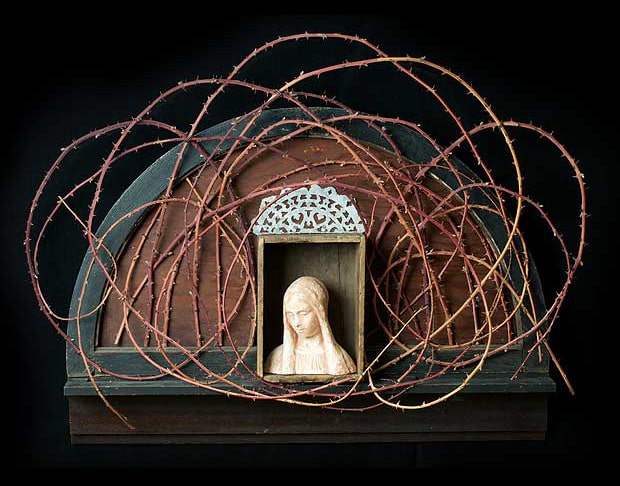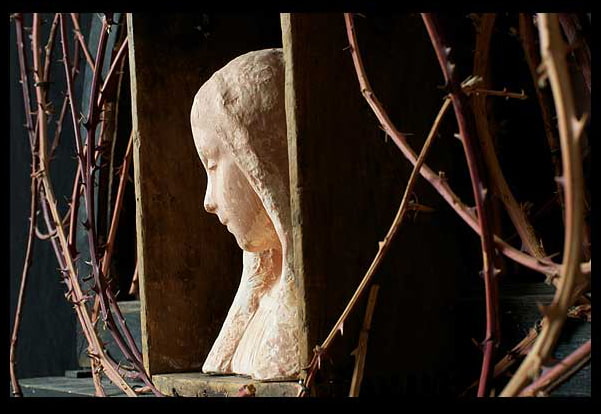January 2: Love and Pain (and Joy)
♫ Music:
The Ponderings of Mary
Luke 2:34-35 & Luke 2:19
And Simeon blessed them and said to Mary his mother, “Behold, this child is appointed for the fall and rising of many in Israel, and for a sign that is opposed (and a sword will pierce through your own soul also), so that thoughts from many hearts may be revealed.” And Mary treasured up all these things, pondering them in her heart.
The Way of Pain
by Wendell Berry
1.
For parents, the only way
is hard. We who give life
give pain. There is no help.
Yet we who give pain
give love; by pain we learn
the extremity of love.
2.
I read of Abraham's sacrifice
the Voice required of him,
so that he lead to the altar
and the knife his only son.
The beloved life was spared
that time, but not the pain.
It was the pain that was required.
3.
I read of Christ crucified,
the only begotten Son
sacrificed to flesh and time
and all our woe. He died
and rose, but who does not tremble
for his pain, his loneliness,
and the darkness of the sixth hour?
Unless we grieve like Mary
at His grave, giving Him up
as lost, no Easter morning comes.
4.
And then I slept, and dreamed
the life of my only son
was required of me, and I
must bring him to the edge
of pain, not knowing why.
I woke, and yet that pain
was true. It brought his life
to the full in me. I bore him
suffering, with love like the sun,
too bright, unsparing, whole.
LOVE AND PAIN (AND JOY)
Advent is a season of joy. But Joy is a complicated word.
Joy is not simply merriment. It is not simply peppermint mochas and caroling and cookie decorating. Joy is not the idyllic scene of sipping mulled wine by a crackling fire on a snowy night, while watching Home Alone with your family together.
Joy is more like the quiet feeling after. When everyone leaves. When the fire goes out. When the kitchen is a mess and the dishes need washing. When all that remains is the memory of laughter and a sense of loss, for all that we love that will one day be gone.
Joy is the afterglow. The day after. Joy is January 2, when the climax of Christmas and the newness of New Year’s have passed.
C.S. Lewis captures the paradox of joy in Surprised by Joy, noting that joy might well be equated with “a particular kind of unhappiness or grief,” but “a kind we want.”
Lewis goes on to say: “I doubt whether anyone who has tasted [joy] would ever, if both were in his power, exchange it for all the pleasure in the world. But then Joy is never in our power and pleasure often is.”
Zadie Smith wrote an essay a few years ago on joy, also contrasting it with pleasure. Reflecting on a phrase from writer Julian Barnes (“It hurts just as much as it is worth.”), Smith said this:
“It hurts just as much as it is worth. What an arrangement. Why would anyone accept such a crazy deal? Surely if we were sane and reasonable we would every time choose a pleasure over a joy, as animals themselves sensibly do. The end of a pleasure brings no great harm to anyone, after all, and can always be replaced with another of more or less equal worth.”
Joy is costly, but it is worth it. We choose joy when we go “all in” with our love, knowing that pain will be a necessary part of it. As Wendell Berry so beautifully puts it in his poem, The Way of Pain, “by pain we learn the extremity of love.”
We see love and pain in Heidi Petersen’s All Our Sorrows. With its bust of Mary in a ponderous pose (perhaps the “ponderings” of Luke 2), surrounded by the thorns her son would one day wear as a crown, this work embodies the sort of melancholy joy that is the alchemy of love and loss and hope and fear.
When I contemplate the visage of Mary in this work, as I listen to the song “Christmas Mourning” by J.A.C. Redford, I almost picture Mary as a mother of a large family, on Christmas night. She’s standing at the sink alone, looking down at the dishes she scrubs in the wake of the day’s Christmas feast. Her young sons have all gone to bed, exhausted by the frivolity of the day: stockings, candy, presents, games, snowball fights, turkey, pie, play. In the quiet of the night, herself exhausted, this mom’s heart is full of pondering. She treasures the pictures of her sons’ smiling faces; their laughter; their attentive awe as their father reads them the Christmas story. She treasures these moments with that joyful mix of love and pain, knowing that their lives (and hers) are as frail and fleeting as the falling snow.
Prayer
Jesus,
Thank you for becoming human,
Knowing the peculiar pangs of love and pain as we do.
Thank you for pursuing the cross,
Knowing its cost, but also for the joy set before you.
Thank you for wiring us to be unsatisfied by pleasure,
Knowing that only you satisfy.
Thank you for giving us eternal hope in this temporal world.
Amen.
Brett McCracken
Associate Director of Presidential Communications
All Our Sorrows (2 images)
Heidi Petersen
Assemblage
About the Artist and Artwork:
Heidi Petersen a native of Portland, Oregon, received a Bachelor’s degree in Drawing & Painting from Biola University. She has taught art at Willowbrook School of the Arts in Oregon and her work has been shown at the Waterstone Gallery in Portland. Heidi is known for her provocative assemblages.
http://www.heidipetersen.com
About the Music:
“Christmas Mourning”
Lyrics:
On Christmas day I weep,
Good Friday to rejoice.
I watch the Child asleep.
Does he half-dream the choice,
The Man must make and keep?
At Christmastime I sigh,
For my Good Friday hope.
Outflung the Child’s arms lie,
To span in their brief scope,
The death that Man must die.
Come Christmastide I groan,
To hear Good Friday’s pealing.
The Man, racked to the bone,
Has made His hurt my healing,
Has made my ache His own.
Slay me, pierced to the core,
With Christmas penitence.
So I who, new-born, soar,
To that Child’s innocence,
May wound the Man no more.
About the Lyricist:
Vassar Miller (1924-1998) was a writer and poet born in Houston, Texas. Her lifelong struggle with cerebral palsy made the simplest tasks arduous, yet inspired 10 volumes of searing and highly regarded poetry. She began writing as a child, composing on a typewriter due to the cerebal palsy which affected her speech and movement. Ms. Miller's work often explored religious themes, although she also wrote about her own pain and sense of isolation, and there were occasional flashes of acid humor. Poems collected in Wage War on Silence made her a finalist for the Pulitzer Prize in 1961. She also was twice named the poet laureate of Texas.
About the Composer:
J.A.C. Redford (b. 1953) is a composer, arranger, orchestrator, and conductor of concert, chamber, and choral music, film, television, and theater scores. His many recordings include three collections of his concerts, chamber and choral music: Eternity Shut in a Span, Evening Wind, and The Alphabet of Revelation. Redford has written the scores for more than three dozen feature films, TV movies or miniseries, including The Trip to Bountiful, Oliver & Company and Newsies. His 500 episodes of television include multiple seasons of Coach and St. Elsewhere, for which he received two Emmy nominations. His collaborations with other artists include conducting The Little Mermaid, and orchestrating the scores for Avatar, WALL-E, and Skyfall, for which he also arranged and conducted Adele’s Oscar-winning title song.
www.jacredford.com
About the Performers:
The Utah Chamber Artists, based in Salt Lake City, Utah, was established in 1991 by Music Director Barlow Bradford. The ensemble consists of forty singers and forty players. Besides presenting the traditional and revered repertoire of the past, the group provides audiences with contemporary works and regularly commissions new music. The musicians perform out of their love for great music and a genuine desire to enrich the lives of their listeners.
http://www.utahchamberartists.org/
Dr. Barlow Bradford has distinguished himself as a conductor, composer, arranger, pianist, organist, and teacher. He co-founded the Utah Chamber Artists in 1991 and has led that organization to international acclaim. His focused, energetic conducting style led to his appointment as music director of the Orchestra at Temple Square in Salt Lake City and associate director of the Mormon Tabernacle Choir. Prior to that, he was director of orchestras at the University of Utah. His compositions and arrangements have garnered much attention.
http://www.barlowbradford.com/
About the Poet
Wendell Berry (b. 1934) is an American novelist, poet, environmental activist, cultural critic, and farmer. A prolific author, he has written many novels, short stories, poems, and essays. He is an elected member of the Fellowship of Southern Writers, a recipient of The National Humanities Medal, and the Jefferson Lecturer for 2012. He is also a 2013 Fellow of The American Academy of Arts and Sciences. Berry was named the recipient of the 2013 Richard C. Holbrooke Distinguished Achievement Award. On January 28, 2015, he became the first living writer to be inducted into the Kentucky Writers Hall of Fame. In “The Way of Pain,” Berry considers how the experience of the cross in the brokenness of personal anguish leads to “the extremity of love.”
http://wendellberrybooks.com/

